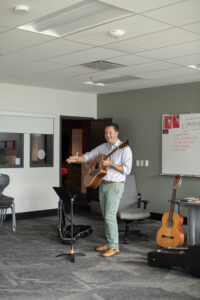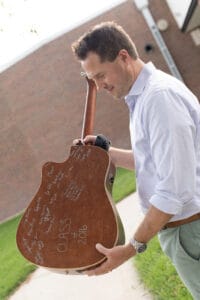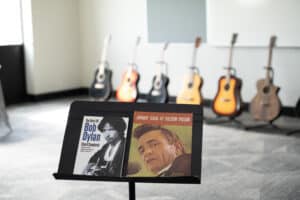By Gayle Gresham
Photos by Thea Sonnenberg, Big Country Photography
The room fills with the sound of 14 guitars strumming in unison to the Eagles’ song, “Take It Easy.” The faces of the high school students are intent on following the chord progression on their computer tablets while their teacher, Mr. Zahller, sings and plays his guitar. Rob Zahller is the middle school and high school band teacher for the Yuma School District on the plains of eastern Colorado, not far from the Nebraska state line. As the music fades and Mr. Zahller announces the next song, Buddy Holly’s “Peggy Sue,” a few groans can be heard as he starts the fast, driving downward strum of the song, but all of the students join in with a bit more concentrated effort. At the end of the class, Mr. Zahller asks each student to share their least favorite song to play — it’s “Peggy Sue” all around.
With a repertoire of more than 100 songs including pop, country, and rock from the ’50s, ’60s, and ’70s, which the students learn during the school year, the guitar class is a popular choice for students. But for Rob Zahller, it is a means for connecting kids to more than music. It is an opportunity for the kids to try something they may not have seen themselves doing and a place to learn how to belong in different groups.

COMING HOME
Zahller began teaching band in Yuma in 2007. But living in Yuma wasn’t anything new to him. His parents moved to Yuma in the 1970s. “I started out on trombone in the fifth grade at Yuma Middle School, the exact same place I am teaching now,” he says with a laugh.
Yuma had a strong music program when Zahller was in school. He had the same band teacher from fifth grade through high school. “I was lucky that I had teachers in public school and at college who took an interest in me,” Zahller says. “It would have been easy to fall by the wayside, especially in a little town where music isn’t as big as it is in some other schools.”
Zahller majored in music education at Hastings College in Nebraska where he had professors who were good teachers and even better conductors. He noticed that some of his professors were involved in both performance and conducting, and he decided that was a great way to “stay in the game.”
After graduating college, Zahller was hired as the band teacher at Boys Town in Omaha, Nebraska. Boys Town was founded by Father Edward J. Flanagan, who opened an orphanage for boys in 1917. Boys Town and Father Flanagan were made famous by the movie released in 1938 starring Spencer Tracy and Mickey Rooney. According to Zahller, the Father Flanagan model is based on giving kids in Boys Town a community. “The family setting is totally emphasized every day. The married couples in each home with eight children are called ‘family teachers.’ And I was called the ‘assistant family teacher.’ Everything is based on family.”
At Boys Town, Zahller went to work and engaged with eight boys, attending their parent-teacher conferences, cooking dinner with them, celebrating with the boys when they did something positive, and issuing appropriate consequences when they did something negative.
“I cut my teeth with that being my everyday job,” he says. “I learned a lot of great things from the people I worked with at Boys Town. The model is great and I still use it in my classroom.”
Zahller spent three and a half years teaching at Boys Town, and every year the acting principal of Yuma Middle School and High School would call him and say, “The band position is open again.”
“I knew enough to know that is not the way to have a healthy program, to be constantly in limbo. So, after the third year of saying no, I decided it was time for change,” he says. “The cards fell into the perfect position. My wife graduated with a degree in biology from Creighton University, and there was an opening for both a science position and a band position in Yuma. My wife’s family lived in Otis, and my mom and dad lived in Yuma. If there was ever a divine intervention to move, then this was probably the perfect time to move.”

REBUILDING THE BAND PROGRAM
When Zahller arrived back in Yuma, he saw little of the strong band program he had thrived in as a kid. There were only 14 students in the band class. He reached out to those band students and got to know them over the summer to keep them connected to the band program.
“Even though the band was small, they were all kids who really wanted to be there, so it was quite easy to be their teacher,” Zahller recalls. “They were excited to have somebody come back and be involved in the process, and it worked out pretty good.”
Drawn to Zahller’s enthusiasm, fun sense of humor, and genuine care for each student, the band started growing. Within a few years, roughly 80 students joined the band.
Based on his experiences of growing up in Yuma and teaching at Boys Town, Zahller recognizes band as one of the activities, like sports or theater or art, that can span grade levels and seasons in a student’s life. “My philosophy is to give kids a consistent, safe place to be involved in for a longer period of time. I say, ‘Welcome into this group as a fifth grader and I look forward to giving you a hug on your senior graduation day.’ That’s the net I try to cast over everybody who comes in as a fifth grade band student.”
While Zahller acknowledges it doesn’t always happen this way, in his mind it’s the “if everything works perfectly” goal. He believes band can give kids a sense of connection to the school, to their peer group, and even to groups they might not think they fit into. Band offers the opportunity for students of different ages and genders to work together. It typically starts with belonging to and practicing music with a small group of students who all play the same instrument, and then learning how that fits into being a member of the larger band made up of different instrumental sections.
“It’s a good thing for kids who haven’t experienced this. If we can get them in band, that’s one more feather in their cap to say, ‘I am good at involving myself in a peer group that might not be one I chose, but it definitely exists, and it is definitely good for me.’ And that far exceeds the expectation that we are just going to get together and play music.”
Zahller sees the ability to move from small groups to larger groups as a vital skill in life, particularly for students who grow up going to rural or small schools, “because I know that was important for me. Band was my big group, and it shaped me to be the type of person who was comfortable ebbing and flowing to big groups from there on out.”
The band at Hastings College was almost as big as his entire high school in Yuma, but Zahller says he wasn’t fearful going into the college band because he knew that would be a group that would accept him and that he would feel comfortable in it. “I try to recreate that in little ways for our kids who are here in high school in Yuma.”
CHALLENGES
In 2020, the pandemic threatened the safe place and connection Zahller worked so hard to bring to the band program. “The pandemic was tough, not just for me but for every teacher. There were so many variables and just when you thought you could figure it out, it constantly reinvented itself. It was really hard. You can’t do music virtually.”
Some kids practiced their instruments more on their own, but playing together as a band virtually was impossible. “I tried to do supplemental assignments that would give them things to listen to. There were lots of opportunities available. For example, some symphonies made their archives accessible to us. I tried to give them music appreciation avenues to go down, which was neat because usually there isn’t time for this when we are trying to get in rehearsals.”
The hardest part for Zahller is knowing the loss of skills and momentum that students faced over the two-year period the pandemic spanned. “The students lost out on formative years, no matter whether they were a sixth grader or a sophomore. They lost out on being able to connect the dots and getting those benchmarks met, and now in 2023 we are wanting things to sound the way they did in 2017, but it doesn’t because there is a missing piece of the puzzle.”
When the students returned to school, everything was different. New regulations made rehearsing difficult. “Our health department required that there be 10 feet of space around each student. I had 65 students in band, so it took our entire auditorium to sit them spaced out from each other. But, even with that, it was good to have everyone back together.”

SUCCESSES
Looking back at 2020, Zahller recalls a success story — the guitar class. He figured out how to use Google Classroom and Zoom in a way that they could play together. “I could get all of my kids online, on my screen, and they would mute themselves and listen through their earphones. I would be the only one miked, so they could hear me play and sing and I could see them playing and singing back. I just couldn’t hear them. It was cathartic because that was the only thing that was really real for me in that whole stretch of a year and a half when things were weird.”
Zahller started the guitar class in 2013 with donated guitars. The class provides another opportunity for kids to engage in something that brings connection and growth. “Kids who might not ever pick up a band instrument will decide to learn how to play guitar. And it is another way to help them connect to a peer group.”
Even though his dad played guitar when he was growing up, Zahller never cared to learn to play. His dad started giving guitar lessons to some of the high school kids after Zahller went to college. Eventually, Zahller took a classical guitar class, which he learned was not his favorite thing. But he started playing guitar and singing and discovered he enjoyed it. “I wish I’d had this guitar class when I was a kid. But I’m making up for it now. It’s pretty fun!”
The class is popular with the students. Zahller tells the story of one student who loved learning the guitar and spent so much time practicing that his other academic studies suffered. Today he plays jazz and alternative music with bands in Montana. Another former student plays guitar in a house band in Nashville.
Zahller shares another win that he sees every day with former students. “I work with a lot of people I taught who are now also teachers at Yuma Middle School and High School. I love that! It’s such a neat feeling because it’s contagious! Like maybe I did something right enough and other teachers did something right enough that this is right where you should be.”
And Rob Zahller is right where he should be — teaching music, building community, and preparing students to move from band and guitar classes in Yuma, Colorado, to finding their places and people in this big, wide world.
Gayle Gresham was honored to strum along with Rob Zahller’s guitar class. She learned guitar in a sixth grade class and still plays in a bluegrass-gospel group with her husband. Gayle writes from her home in Elbert, Colorado.










